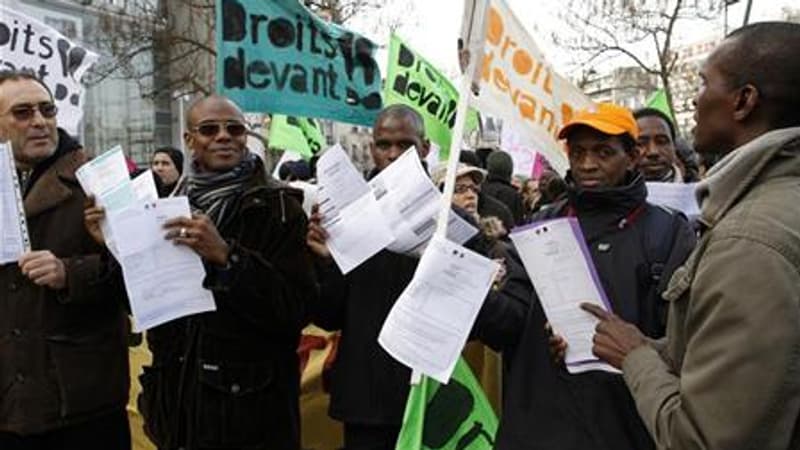This is a divisive measure. Article 3 of the immigration bill, which will be presented to the Senate starting November 6, plans to regularize a portion of undocumented workers who perform “shortage jobs.” An article that the right dislikes and on which the executive could finally back down by eliminating it from the text.
But if it decides not to completely abandon this measure, the government should opt for the regulatory route. “Does this happen by law, decree or regulation? I am open to the modalities,” declared the Minister of Labor, Olivier Dussopt, in the columns of the Télégramme on Sunday, October 22.
Because it is a reality today in France: thousands of foreigners without a residence permit work, receive payrolls every month and contribute, without any right in exchange. Last week, hundreds of workers hired at the L’Arena construction sites in Porte de la Chapelle – a key site for the Paris 2024 Olympic Games and also the future headquarters of the Paris basketball club – launched a strike movement to obtain their regularization .
How many are there today in France? How do they get to work and what would the creation of a residence permit due to a “shortage of jobs” change for them?
How many people are affected?
The number of undocumented workers is very difficult to evaluate given that there is no official data on the matter. However, there are estimates. The CGT thus estimates the number of undocumented workers in France at around 700,000. An article in Le Monde from November 2022 cited a range of 400,000 to one million to quantify the number of foreigners in an irregular situation, whether they work or not.
For Amadou Ndiaye, a lawyer specialized in foreigners’ rights, this figure is “enormous” and is due to the series of migration crises that have occurred since 2010 in Europe. In all cases, it seems that these workers represent a significant proportion of jobs in France, distributed variably according to the sector.
“In certain professions, they are overrepresented: 25% of kitchen assistants, 24% of cleaning women and men. In all these sectors we have difficulties hiring,” the minister also explained.
How do they manage to hire these people?
“Often, these people signed employment contracts at a time when they had papers, but then these were not renewed for one reason or another,” indicated Olivier Dussopt in Franceinfo on October 17, to justify their regularization.
However, according to Me Amadou Ndiaye, this situation is not the most common. “Most of them have never had papers,” he says. Therefore, they can use a nominee and use the identity and social security number of a loved one. But employers are often aware or voluntarily turn a blind eye. “It even happens that they are the ones who advise their illegal employees on this type of maneuver,” says Me Ryamond Cujas, a lawyer specialized in immigration law.
Une situation qui s’explain avant tout par des difficultiesés de recrutement et d’important kisses in main d’oeuvre dans des secteurs dits en tension que sont le BTP, l’hôtellerie-restauration, la propreté, la maintenance ou l’aide à person.
The signatories of various political parties, from the PC to Modem, denounced a “collective hypocrisy” that leads to their “precariousness.”
Why are they not regularized?
Today, a foreigner can request regularization when he works under the conditions defined by the so-called Valls circular of 2012 and obtain a residence card for exceptional admission to the stay. But to do this he must be able to meet the criteria defined by the circular and justify several years of work on French territory, even if this is prohibited by law.
Specifically, the application file must contain eight payrolls in case of presence in the territory for at least five years, or twenty-four, in case of three years of presence.
Any undocumented worker who wants to request regularization via exceptional admission to residence for work must also obtain a “work authorization” from their employer. This document, which many cannot obtain, thus puts their regularization in the hands of the employer, who makes them work illegally.
However, even if the applicant manages to gather all these supporting documents, this does not in any way guarantee obtaining a residence permit.
In other words, the issuance of this exceptional residence permit is at the discretion of the prefect, who may decide not to grant it, without any justification.
Not to mention that the procedures are complicated to carry out. “Exceptional income comes at the end of the package and nowadays it is very difficult to get an appointment,” indicates the specialist lawyer.
What would section 3 or its regulatory equivalent change?
Whether adopted within the framework of the immigration bill or in regulatory form, the creation of a “residence permit for scarce occupations” should make it possible to systematize the regularization of undocumented workers who practice a profession considered “shortage.” “This regularization through work would become a right and no longer an assessment by the administration,” says Amadou Ndiaye.
As defined by the law, the criteria for obtaining this residence permit should be made more flexible and simplified compared to the Valls circular, which requested eight payrolls after three years of presence in the territory. Finally, the employer agreement will no longer be a necessary condition to make a request for regularization for work.
However, there are points to be clarified in relation to the conditions for the issuance of this residence permit. Gérard Ré highlights the risk that “very few people” will be affected and questions the eligibility of temporary workers who, according to him, represent “a majority of undocumented workers.”
Source: BFM TV


